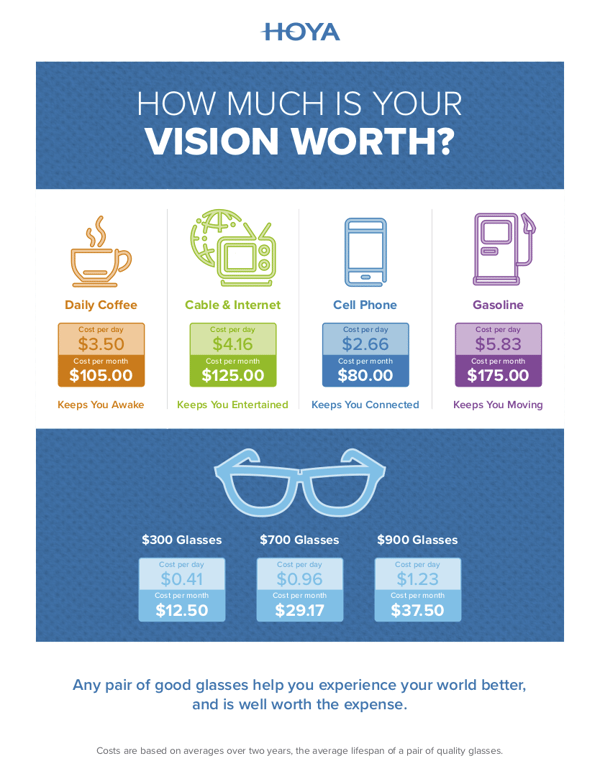We’ve all been there, either online or in a store, trying to decide if we go for the premium brand with all the bells and whistles or the budget option. Do you really need the brand new 8K Sony TV, or will the in-house brand 4K TV work out just fine?
This debate happens in eye doctor’s offices across the nation, and it’s a good debate to have. Weighing the pros and cons of any investment is a good decision. Don’t sell your eyes short, though.
The Value of Your Glasses
Budgeting for glasses can come with some sticker shock, but that doesn’t mean you should write off a pair that will provide you more value. Premium lenses include more technology to help keep your eyes healthy and seeing better, literally.
Just like a TV can have smart functionality, different levels of picture quality, and extra features like HDR, your glasses have different features you should consider.
Treatments and Coatings
Think of treatments and coatings like an add-on to your lenses. They change their features and serve different purposes depending on what kind of glasses you need. There are treatments for anti-reflection (AR) that often help the scratch resistance of your lenses. Other treatments like blue light filtering help relieve digital eye strain and reduce the damage of these light rays from digital devices.
Coatings may be an “add-on,” but they help you get more life out of your glasses, and help you see better.
Specialized Lenses
As glasses technology has improved you can now specialize their purpose. There are computer glasses that help reduce the strain on your eyes throughout the workday. Light reactive lenses are great for weekend warriors that want to keep their eyes safe no matter where an adventure takes them. Progressive lenses have replaced bifocals as a versatile pair of glasses and replace the need for separate readers and primary glasses.
Having specialized glasses for your hobbies and work is important. This does mean that you will want more than one pair of prescription glasses, the benefits mean your eyes won’t be tired after a long day in front of the computer or will stay safe during your outdoor adventures.
Learn more about the importance of multiple pairs of glasses.
Premium Materials
Not all materials are made equal when it comes to glasses. The day of glass in your frames is mostly gone, many lenses are now specialized plastic. Different materials have different properties, weight, durability, and thickness. Newer innovations such as Phoenix Trivex lenses help treatments and coatings adhere better, increasing their effectiveness. Other materials are the lynch-pin to specialized lenses.
Ask your eye doctor about the different material pros and cons for your specific eye care needs. According to consumer studies by The Vision Council, the number one attribute people want from their lenses is "light and thin." The close #2 is scratch resistant. The different combination of materials and coatings available by your local optician are designed to delight you by meeting both of those desires.
Think of It Like The Rest of Your Budget, Monthly.
So now that we’ve covered some of the features that go into the difference between a $300 and a $900 pair of glasses, the question becomes what’s right for you? It can feel difficult to make a $900 purchase, no matter what it is.
Glasses are too important to undervalue, though. If you start to break down some of your staple expenses from a month-to-month basis, you can truly start to understand the value of your glasses.

When you start to look at it this way, you’ll see that the cost of a premium pair of glasses doesn’t just stand up to your other expenses, it blows them out of the water. The right specialized lens, premium material, or treatment; customized to your specific visual needs, can make a world of difference for how you see the world. Not to mention that treatments like EX3 that increase their scratch resistance can actually expand the life of your eyewear.
So next time you find yourself at the eye doctor, have a conversation with them about the different options they recommend, and why they recommend each. They’ll help you find the perfect pair for what you need, at the right value.




.jpg?width=80&name=N.Vlasak%20(002).jpg)